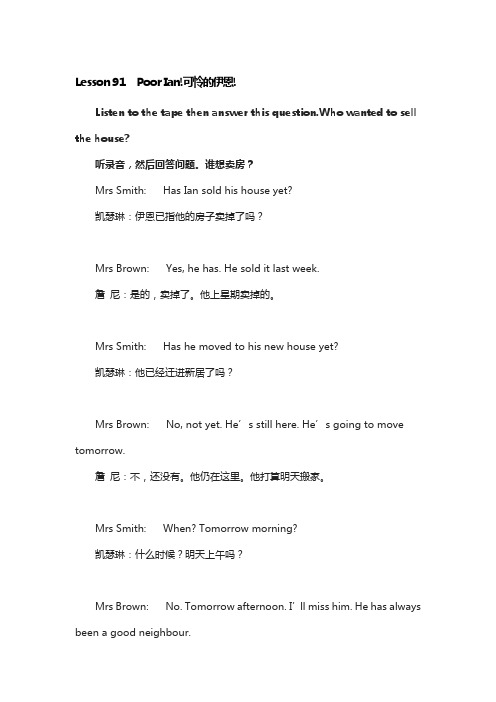新概念英语第一册91课单词
新概念英语第一册91课最新版本ppt课件

着
.
★move v. 搬家;感动 The story moves me. move to 搬到……地方 move in 搬进 move out 搬出来 move away 搬走 move into 搬进(由外到内的过程)
.
★miss v. 想念,思念 ① v. 想念,惦念 ② v. 错过;未做到 He overslept and missed his train. 他 睡过了头,错过了他那班火车。 I missed an opportunity of realizing my dream. 我错过了一个可能实现自己梦想的机会。
.
三 课文
CATHERING:
Has Ian sold his
house yet?
JENNY: Yes, he has. He sold it
last week.
CATHERING:
Has he moved toENNY: No, not yet. He's still
his wife did!
.
1.We'll all miss him. 我们大家都会想念他 的。
all,大家,全部,指3个或3个以上的人或 物;指两个用both。这里的all作we的同位语。 2.…but his wife did.……可是他妻子离开。
句中 did代替上文中的 wanted to leave。 语法 Grammar in use 一般将来时 (1)一般将来时表示将来某一时刻的动作、 状态以及打算。该时态一般与表示将来意义 的时间状语连用,如tomorrow(明天),this month(本月), the day after tomorrow (后天),next week (下周), in two days' time(两天之后), from now on(从 现在起),in the future(将来)等。 (2)一般将来时. 的形式为 will/shall+ 动词 原形。
新概念英语第一册91课(课堂PPT)

★变疑问句
Will you go to America tomorrow? Will Jack move into his new house tomorrow morning? ★变否定句(shan’t/ won’t) I will not go to America tomorrow. Jack will not move into his new house tomorrow morning. ★肯定回答及否定回答
•They swam (swim) across the river the day before
yesterday.
•I haven’t spoken
(not speak) to him yet.
•She gave (give) me a banana two days ago.
•A train left (leave) for London an hour ago.
•…
42
people
• n. ①人们
• There are a lot of people in the street.
• 街上有很多人。
• the people
• 民众,人民,国民
• ②民族
• person 强调的个体的人,可以有复数形式
•
persons
• people 通常是人的统称,单复数形式相同
9
10
11
12
13
14
15
16
17
18
19
20
21
22
新概念第一册91-98课

★person n.(强调个体,不分男女老少,有复数persons) The person in a hat is my father.★people n.(强调集体,是集合名词)How many people are there in your family?personn. 人He is a nice/good person.他是个好人。
in person亲自,直接的He will go to get the money in person.他将亲自去取钱。
personaladj. 个人的,私人的a personal letter反意疑问句:-He didn’t go to school yesterday, did he?-No, he didn’t.(是的,他没去。
)Yes, he did.(不,他去了。
)注意没有混搭形式:Yes, he didn’t. / No, he did.6. -In five hours' time!=The next train will leave in five hour’s time.in +时间段’s + time = in +时间段一般将来时的时间状语标志词(表示在多长时间之后)in a/one day’s time = in a/one dayin three weeks’time = in three weeksYou have to finish the meal in 10 minutes.10分钟你必须吃完饭。
4. We had better go back to the station now.情态动词had better + 动词原形,表示“最好做某事”。
否定式:had better not do sth.We’d better eat an apple everyday.我们最好每天吃一个苹果。
Let's go and have a drink.Let’s go and do sth.让我们去做某事。
新概念英语一册课后练习答案(Lessons91-92)

【导语】新概念英语作为家喻户晓的经典之作,它有着全新的教学理念,有趣的课⽂内容及其全⾯的技能训练,为⼴⼤的英语学习者提供帮助!如果你也想学好英语,⼜怎能错过新概念英语?下⾯为您提供了相关内容,希望对您有所帮助! 新概念英语第⼀册91-92课词汇学习 Word study miss v. (1)想念,惦念: We'll miss you. 我们会想念你的。
His mother misses him very much. 他母亲很惦念他。
(2)错过;未做到: He overslept and missed his train. 他睡过了头,错过了他那班⽕车。
I missed an opportunity of realizing my dream. 我错过了⼀个可能实现⾃⼰梦想的机会。
still adv. (1)还是,仍然: I still don't understand what he meant. 我还是不明⽩他是什么意思。
She was still beautiful at the age of 46. 她46岁时依然美丽。
(2)还要,甚⾄更: It was hot yesterday, but it's still hotter today. 昨天很热,然⽽今天甚⾄还要热些。
She looked very ill last week and this week looks still worse. 上星期她看上去病得很厉害,⽽这个星期看来更不⾏了。
(3)静⽌地;安静地: He is sitting still. 他⼀动不动地坐着。
The patient is lying still. 病⼈安静地躺着。
新概念英语第⼀册92课课后练习答案 Key to written exercises Lesson 92 A 1 He'll arrive tomorrow morning. 2 She'll come this evening. 3 It'll snow tonight. 4 He'll not believe me. B 1 Yes, and it will snow tomorrow, too. 2 Yes, and he will get up late tomorrow, too. 3 Yes, and he will arrive late tomorrow, too. 4 Yes, and he will finish work late tomorrow, too. 5 Yes, and she will drive to London tomorrow, too. 6 Yes, and she will telephone him tomorrow, too. 7 Yes, and he will have a shave tomorrow, too. 8 Yes, and she will sweep the floor tomorrow, too.。
新概念英语第一册第91

新概念英语第一册第91Lesson 91 Poor Ian!可怜的伊恩!Listen to the tape then answer this question.Who wanted to sell the house听录音,然后答复下列问题。
谁想卖房?Mrs Smith: Has Ian sold his house yet凯瑟琳:伊恩已指他的房子卖掉了吗?Mrs Brown: Yes, he has. He sold it last week.詹尼:是的,卖掉了。
他上星期卖掉的。
Mrs Smith: Has he moved to his new house yet凯瑟琳:他已经迁进新居了吗?Mrs Brown: No, not yet. He s still here. He s going to move tomorrow.詹尼:不,还没有。
他仍在这里。
他打算明天搬家。
Mrs Smith: When Tomorrow morning凯瑟琳:什么时候?明天上午吗?Mrs Brown: No. Tomorrow afternoon. I ll miss him. He has always been a good neighbour.詹尼:不,明天下午。
我会想念他的。
他一直是个好邻居。
Mrs Green: He s a very nice person. We shall all miss him.琳达:他是个非常好的人,我们大学都会想念他的。
Mrs Smith; When will the new people move into this house凯瑟琳:新住户什么时候搬进这所房子?Mrs Brown: I think that they will move in the day after tomorrow.詹尼:我想他们将会在后天搬进来吧。
Mrs Green: Will you see Lan today, Mrs Brown琳达:詹尼,您今天会见到伊恩吗?Mrs Brown: Yes, I will.詹尼:是的,我会见到他。
新概念英语第一册第91-92课:Poor Lan

Lesson 91 Poor Ian!可怜的伊恩!Listen to the tape then answer this question.Who wanted to sell the house?听录音,然后回答问题。
谁想卖房?Mrs Smith: Has Ian sold his house yet?凯瑟琳:伊恩已指他的房子卖掉了吗?Mrs Brown: Yes, he has. He sold it last week.詹尼:是的,卖掉了。
他上星期卖掉的。
Mrs Smith: Has he moved to his new house yet?凯瑟琳:他已经迁进新居了吗?Mrs Brown: No, not yet. He’s still here. He’s going to move tomorrow.詹尼:不,还没有。
他仍在这里。
他打算明天搬家。
Mrs Smith: When? Tomorrow morning?凯瑟琳:什么时候?明天上午吗?Mrs Brown: No. Tomorrow afternoon. I’ll miss him. He has always been a good neighbour.詹尼:不,明天下午。
我会想念他的。
他一直是个好邻居。
Mrs Green: He’s a very nice person. We shall all miss him.琳达:他是个非常好的人,我们大学都会想念他的。
Mrs Smith; When will the new people move into this house?凯瑟琳:新住户什么时候搬进这所房子?Mrs Brown: I think that they will move in the day after tomorrow. 詹尼:我想他们将会在后天搬进来吧。
Mrs Green: Will you see Lan today, Mrs Brown?琳达:詹尼,您今天会见到伊恩吗?Mrs Brown: Yes, I will.詹尼:是的,我会见到他。
新概念英语第一册L91
12/14/2013
1.miss 想念 2.neighbour邻居 3.will+动词原形 表将要 4.person/people(person强调个体,有复数,people是 12/14/2013 人的统称,单复数同行)
一般将来时
①表示将来将要发生的动作 ②tomorrow, next year this month the day after tomorrow the year after the next in five hours‘ time …
1miss想念2neighbour邻居3will动词原形表将要4personpeopleperson强调个体有复数people是人的统称单复数同行2242018表示将来将要发生的动作tomorrownextyeardayaftertomorrowyearafterfivehourstime2242018结构
12/14/2013
When will the new people move into this house? I think that they'll move in the day after tomorrow. Will you see Ian today, Jenny? Yes, I will. Please give him my regards.
反义疑问句
You’re a student, aren’t you?
Yes, I am. No, I’m not.
He didn’t go to school, did he? 他没有去上学,是吗? No, he didn’t.
You aren’t a student, are you?
Yes, I am. (不,我是一个学生。)
新概念英语第一册第91-92课ppt课件
6
★neighbour
n. 邻居
neighbourhood
n.四邻,邻近地区
这一带很安静。
This is a quiet neighbourhood.
他要搬到这一带。
He is moving into the neighbourhood.
in the neighbourhood of
10
rain snow leave get up arrive finish work have a holiday drive home
have a haircut telephone me have a shave pack his bags sweep the floor paint this room repair my car
He’s still here.
将来时的时间状语
He’s going to move tomorrow.
be going to 打算做某事
25
将来时的时间状语
CATHERING: When? Tomorrow morning?
JENNY:
No. Tomorrow afternoon.
I'll miss him. 思念,想念 错过
make an appointment
11
02
Practice
12
• still • move • miss • neighbour • person • people • poor
v. 想念,思念 n. 邻居 adv. 还,仍旧 v. 搬家 n. 人 adj. 可怜的 n. 人们
13
03
Game Time
新概念英语第一册91课
people 强调复数“许多人,人们”,为集合名 词。
★miss v. 想念,思念
① v. 想念,惦念 • 我想你 • I missed you. ② v. 错过;未做到 • 他睡过了头,错过了他那班火车。 • He overslept and missed his train.
let's review
Listen to the tape,then answer these questions.
1. When did Ian sell his house?
2.When is Ian going to move?
3.When will the new people move into this house? 4.Who wanted to sell the house?
JENNY: No, not yet.
He’s still here.ቤተ መጻሕፍቲ ባይዱ
将来时的时间状语
He’s going to move tomorrow. be going to 打算做某事
move 的用法:
1. move home 2. move into + 宾语
3. move to + 宾语
搬家 搬入到…
过去式
过去时间状语
He went to the doctor’s yesterday.
And she will go to the doctor’stomorrow
将来时 将来时时间状语
They got up early the day before yesterday. 后天the day after tomorrow And they will get up early the day after tomorrow .
新概念英语第一册第91课Lesson91课文单词知识点
【知识点讲解】1. 本课当中我们终于接触到了第一个从句:I think that they'll move in the day after tomorrow.(我想他们后天搬进来。
)这是一个宾语从句,大家在这里只要有一个简单的印象就好,不用太纠结。
这句话中I think that... 是主句,意思是我想……;they'll move in the day after tomorrow. 他们后天搬进来,这后半句是一个完整的句子,就是从句了。
2. 课文最后两句对话:CATHERING: Poor Ian! He didn't want to leave this house. JENNY: No, he didn't want to leave, but his wife did!请注意Jenny 的回答"No, he didn't..."是对前面Cathering 观点的肯定。
这里使用"No"开头,和我们中文的习惯不太一样。
大家可以理解为Jenny 在顺着Cathering 的话说,但翻译成中文时就要改成汉语习惯,译为:是啊,他不想离开。
3. Poor Ian ,意思是可怜的伊恩。
英文中常用Poor XX 来表达同情。
如果朋友遭遇不幸,你可以说"You poor little thing." 你这可怜的小东西!—— 来安慰对方。
Lesson91CA THERING: Has Ian sold his house yet? JENNY: Yes, he has. He sold it last week.CA THERING: Has he moved to his new house yet?JENNY: No, not yet. He's still here. He's going to move tomorrow.CA THERING: When? Tomorrow morning?JENNY: No. Tomorrow afternoon. I'll miss him. He has always been a good neighbour.LIDA: He's a very nice person. We'll all miss him.CATHERING: When will the new people move into this house? JENNY: I think that they'll move in the day after tomorrow. LINDA: Will you see Ian today, Jenny? JENNY: Yes, I will.LINDA: Please give him my regards.CA THERING: Poor Ian! He didn't want to leave this house. JENNY: No, he didn't want to leave, but his wife did! 凯瑟琳:伊恩已他的房子卖掉了吗?詹 尼:是的,卖掉了。
